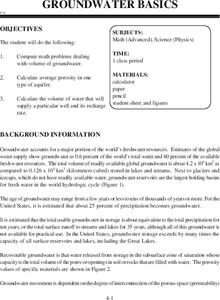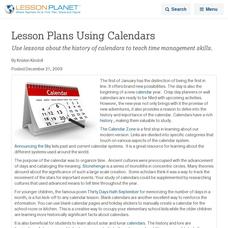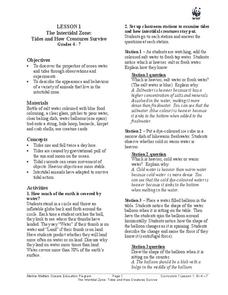Curated OER
Groundwater Basics
Groundwater is an essential natural resource, not to mention a fascinating topic to study. Here is a series of twelve amazing lessons on the water source and how we use it in our daily lives. Concepts require higher math and physics...
Curated OER
Entering The Twilight Zone
In this lesson sixth grade students get into groups and research a given ocean habitat. The major features of cold-seep communities are the objective but plenty information is given about other habitats which could be assigned to...
Curated OER
Climatic Zones
Third graders recognize and locate Frigid, Temperate, and Torrid climatic zones on the word map or globe. They explain that plants, animals, and human societies display adaptations to the climates they live in .
Curated OER
Time Zone
Eighth graders are given a year in history to research and identify the social and cultural situations at the time. In groups, they examine and describe various styles and periods of art and present them to the class. They relate the...
It's About Time
Present-Day Climate in Your Community
So what exactly is climate? This first installment of a six-part series introduces the concept of climate using real-world data tables and topographic maps. The timely lesson includes a comprehensive overview of climate, as well as...
Curated OER
The West the Railroads made
Learners investigate the effects of time and distance for the creation of a successful railroad. In this railroad lesson, students recognize the railroad's need for an exact time schedule was the cause for the creation of time zones. ...
Curated OER
Globe Lesson 12: Global Time
Learners explore the concept of global time. In this geography skills lesson plan, students use standard meridians and the hour scale on globes to determine global time as they respond to questions in this self-directed lesson plan.
Maryland Department of Education
The Concept of Diversity in World Literature Lesson 9: Debating Imperialism
To gain an understanding of Imperialism, class members read Rudyard Kipling's poem, "The White Man's Burden" and Mark Twain's essay, "To the Person Sitting in Darkness." Groups compare these perceptions of non-white cultures with the...
Curated OER
Tides - The Ins and Outs of Tides
Get your junior oceanographers to generate tidal prediction graphs on an interactive website. They will feel like experts in the field, or shall we say, experts in the ocean! This is a brief, but worthwhile activity that could be used to...
Curated OER
The Magic School Bus Goes to Mussel Beach
Students investigate tides and create a model of an intertidal zone. In this hands-on marine science lesson plan based on a Magic School Bus book, the teacher leads students in a discussion about tides, then helps students model a tide...
PBS
Journalism in War Time: What Does the Public Need to Know?
A viewing of the documentary War Feels Like War, launches an exploration of the importance of accurate and comprehensive war reporting. Groups investigate various news agencies and assess the factors that influence their stories. A...
Curated OER
Entering the Twilight Zone
Students describe major features of cold-seep communities and the process of chemosynthesis as it relates to organisms in each habitat. In this deep-sea habitats lesson plan, students study the categorization of ocean habitats according...
Curated OER
Lesson Plans Using Calendars
Students can learn about the history of calendars and the use of time management skills with these lesson plans.
Curated OER
Volcano Lesson Plans
Volcano and earthquake lessons can provide a great way to link science instruction to current events.
Curated OER
No Child Left Inside Lessons
The benefits of taking students outside for outdoor activities and lessons can be substantial for everyone.
National Wildlife Federation
It's All in the Name: Weather Versus Climate
What goes up when rain comes down? An umbrella! Activity eight in the series of 12 explores weather and climate. In pairs, participants analyze maps, watch a short video, create a weather forecast, and complete a reading to determine the...
Curated OER
Football Spelling
Third graders play a football spelling game where two teams spell words and gain yardage for each correctly spelled word. This clever spelling game will be highly motivational for your class! Each team gains ten yards every time they...
Curated OER
Zones of the Rocky Intertidal Zones
Sixth graders predict intertidal zones for organisms. In this intertidal zones lesson, 6th graders analyze an illustration of an organism and a class diagram of the intertidal zones. Students research to locate the zone the organism is...
Curated OER
Zone Ball
Students are introduced to the basics about zone defense in basketball. In groups, they practice this technique to turn away from gravitating to the ball handler. They also complete non-bounce passes and examine how to move without a...
The New York Times
Soccer Fever: Learning About the World Cup in Brazil
What an incredible collection of ideas for teaching about the 2014 World Cup in Brazil! This resource is packed with news articles and instructional activities on a wide variety of topics, from the global popularity of soccer and the...
Curated OER
'Tis a Long, Long Way to Tipperary!
Students practice finding the location of cities across the world by using an interactive Web site, and figure out the world's time and the value of time zones the world over.
Curated OER
Scrambled States
Learners read or are read the story "Scrambled States". Using a map, they identify their states and time zones. They predict their states representation in the book and discuss it after the book is finished. They discvor the differences...
Curated OER
The Intertidal Zone: Tides and How Creatures Survive
Young scholars study the properties of ocean water and tides and learn about animals that live in intertidal zones. In this intertidal zone instructional activity, students participate in classroom stations to learn about fresh water and...
Ocean and Coastal Interdisciplinary Science
The Dark Ocean
Is the ocean blue at all depths? Nope! Explore the science behind the light spectrum in deep, dark waters. The lesson plan recommends watching The Blue Planet: Open Ocean—The Deep, but it's not integral, or you can substitute another...

























